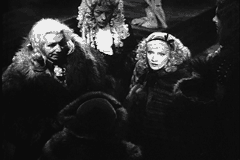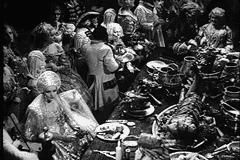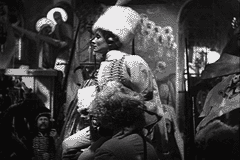|
Newest Reviews:
New Movies -
The Tunnel
V/H/S
The Tall Man
Mama Africa
Detention
Brake
Ted
Tomboy
Brownian Movement
Last Ride
[Rec]³: Genesis
Hara-Kiri: Death of a Samurai
Indie Game: The Movie
Abraham Lincoln: Vampire Hunter
Old Movies -
Touki Bouki: The Journey of the Hyena
Drums Along the Mohawk
The Chase
The Heiress
Show
People
The Strange Affair of Uncle Harry
Pitfall
Driftwood
Miracle Mile
The Great Flamarion
Dark Habits
Archives -
Recap: 2000,
2001, 2002,
2003, 2004
, 2005, 2006,
2007 , 2008
, 2009 ,
2010 , 2011 ,
2012
All reviews alphabetically
All reviews by star rating
All reviews by release year
Masterpieces
Screening Log
Links
FAQ
E-mail me
HOME
| |
The Scarlet Empress (Josef von Sternberg) 1934
 The Scarlet Empress is the first film von
Sternberg film that I've seen, so I would hardly presume to call it his best
work. Nonetheless, the film was immensely accessible to me and surely qualifies
as a masterpiece. The opening credits say the film was based on the diaries of
Catherine the Great, and the film as a whole gives that impression in a most
curious way. Rather than even attempting to give a realistic portrayal of the
characters, we get a film populated by grotesque caricatures. The acting is bad,
but it seems to be intentionally so. The set design, while apparently
historically accurate seems to fixate on the most overbearing aspects of the
palace's architecture. Catherine is a prisoner in her own castle, and every
aspect of the film seems obsessed with painting the world as filtered through
her eyes. Surely, this is one of the great illustrations of the power of mise-en-scene
and the subjective power of cinema. As we watch Dietrich go from dainty naïf to brutal dominatrix,
her opponents are cartoon-like and physically seem to just be manifestations of
their egos, and her conquests are simply attractive, virile men with next to no
substance. We never get the impression that Dietrich is under anything less than
complete directorial control of those around her, and even this adds to the film's palpable feeling
of repression.
The Scarlet Empress is the first film von
Sternberg film that I've seen, so I would hardly presume to call it his best
work. Nonetheless, the film was immensely accessible to me and surely qualifies
as a masterpiece. The opening credits say the film was based on the diaries of
Catherine the Great, and the film as a whole gives that impression in a most
curious way. Rather than even attempting to give a realistic portrayal of the
characters, we get a film populated by grotesque caricatures. The acting is bad,
but it seems to be intentionally so. The set design, while apparently
historically accurate seems to fixate on the most overbearing aspects of the
palace's architecture. Catherine is a prisoner in her own castle, and every
aspect of the film seems obsessed with painting the world as filtered through
her eyes. Surely, this is one of the great illustrations of the power of mise-en-scene
and the subjective power of cinema. As we watch Dietrich go from dainty naïf to brutal dominatrix,
her opponents are cartoon-like and physically seem to just be manifestations of
their egos, and her conquests are simply attractive, virile men with next to no
substance. We never get the impression that Dietrich is under anything less than
complete directorial control of those around her, and even this adds to the film's palpable feeling
of repression.

 

The filmmaking is
invigorating, with some of the images standing out as originals to this day (A
human bell clapper and a drill penetrating the eye of a figure on a mural stick
out most in my mind). Every scene seems constructed to add to our overall
impression of Catherine's repression. When the tone shifts to her liberation,
the film, perhaps tellingly, is at its least successful. Still, the biggest
impression the film leaves is that it must have come before its time. It's got a
great deal of humor in dealing with a subject matter that's not innately funny,
and I'm stunned that a film this sexually vital was given the go ahead in the
30's. There's a feminist streak running though this film, and I can't imagine
how it was viewed when it originally came out. I certainly am compelled to see
more of the director's work after seeing this, and would recommend the film
without reservation, if only because I am sure that the film could play was as
pure camp as well for those not taken in by the film's dramatic hooks.
**** Masterpiece
October 2001
Jeremy Heilman
|